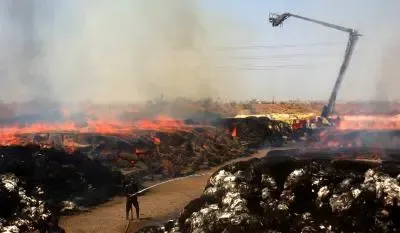Research Indicates Rising City Fire Risks Due to Climate Change

Synopsis
Key Takeaways
- Increasing global temperatures elevate urban fire risks.
- Potential for 330,000 fire-related deaths globally by 2100.
- Limiting warming to below 1.5°C could halve fatalities.
- Study analyzed data from over 2,800 cities in 20 countries.
- Expect significant increases in vehicle and outdoor fire incidents.
Sydney, March 4 (NationPress) - With the ongoing rise in global temperatures attributed to climate change, cities are projected to encounter an increasing threat of fires, as indicated by a collaborative study from Australian and international researchers released on Tuesday.
A recent modeling analysis published in Nature Cities forecasts an uptick in specific categories of urban fires over the next several decades.
The research team estimates that this trend could lead to an additional 330,000 fire-related fatalities and over a million additional injuries globally from 2020 to 2100. However, if global warming is constrained to under 1.5 degrees Celsius, the number of deaths could be halved.
To examine this relationship, the international team investigated fire incidents and peak monthly air temperatures in more than 2,800 cities across 20 countries, including the United States, China, Australia, and Britain, covering over 20 percent of the world’s population. Their findings could assist in future urban planning and emergency response frameworks.
The researchers evaluated how the frequency of various urban fire incidents - including building fires, vehicle fires, and outdoor fires at locations like landfills - is influenced by rising temperatures. This was aimed at assessing the potential effects of climate change on diverse types of urban fires.
Under a scenario of high greenhouse gas emissions, there could be an 11.6 percent increase in vehicle fires and a 22.2 percent increase in outdoor fires by 2100, while building fires may see a 4.6 percent decrease, according to the authors from the University of Science and Technology of China, RMIT University in Melbourne, Shanghai Maritime University, and Charles Darwin University, among others.
They also predict that climate change could lead to around 335,000 fire-related deaths and 1.1 million injuries across all cities studied from 2020 to 2100, as reported by Xinhua news agency.
Climate change encompasses long-term alterations in temperatures and weather patterns, which can occur naturally due to variations in solar activity or significant volcanic eruptions.









